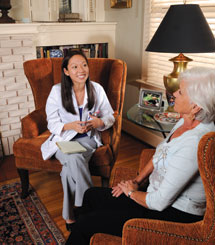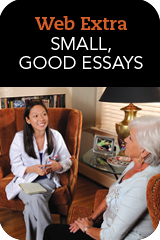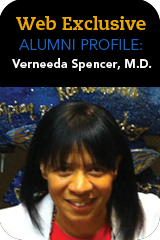The Human Touch
By Cara D. Clark
 |
Visits with a community elder inspired Jaymee Nelson (at left) to write about the nuances of patient interactions. |
There are more ways to look at health care than through a microscope. While science makes up the majority of their curriculum, School of Medicine students also have opportunities to broaden their perspectives through four one-week Special Topics courses.
Last winter, students Samuel Gentle, Forest Huls, Jaymee Nelson, and Rebekah Weil took a Special Topics course dedicated to the medical humanities. Instructor and senior associate dean of medical education H. Hughes Evans, M.D., describes the course “as a way of talking about broader themes in medical education by using film, literature, and history. Our discussions revolved around work/life balance, the pressure to be perfect, stress, fatigue, financial pressures, and the role of humor.” After reading Raymond Carver’s thought-provoking short story “A Small, Good Thing,” the students reflected, via essay, on a redeeming real-life moment in their medical journeys. Here, they offer insights on the course, the essay, and the lasting impact of both. Read their essays here.
What were your expectations for the medical humanities course?
Nelson: I wanted a brief reminder of other aspects of medicine and to reflect on the first year and a half of medical school. I was interested in seeing how the process of medical education was expected to change us, and what other students thought about it.
Huls: I wanted to flex the parts of my brain I hadn’t used as much since making the jump from the humanities to the sciences.
Weil: I expected to watch movies and have a structured, formal discussion of the themes. It turned out to be a very open and relaxed forum, with the opportunity to candidly express our ideas about the films we watched, our own experiences in medicine, and our education.
Gentle: I expected the course to elicit self-reflection on exactly what I'm doing here, now, in medical school, and to help unearth my expectations for my future as a physician. School seems to make me lose sight of things at times, because my focus is often stolen by an upcoming exam or similar distractions.
Did the course surprise or challenge you?
Huls: It was interesting to see that mine isn’t the first generation or the only culture to question how to balance compassion and altruism with the human desire for status, material comfort, and renown. The 1965 Kurosawa film Red Beard, in which a young doctor struggles with resentment after being assigned to a hospital for the rural indigent rather than to the post of private physician to the shogun, could be perfectly reflective of 2010 by changing nothing but the names and settings.
Nelson: We watched a documentary that followed several medical students from the beginning of their education into their residencies and careers. Watching their experiences greatly impact basically every aspect of their lives, then realizing we are going through the same process, was challenging.
Weil: I was surprised at how much freedom we had to talk about the things that affect us. We could be honest about our views, even those not very complimentary to the School of Medicine. The course challenged me to find a voice in my education and understand that I can shape my experience. I can decide what kind of student and physician I want to be, and achieve those goals even if they are not exactly the same goals that the school has for me.
How did you approach the essay?
Huls: The backdrop in Carver’s story is the nightmare experienced by a couple whose injured child is fighting for life, and the “small, good thing” is an incident that injects some humanity and connectedness back into their alienated existence. I’ve never experienced anything so harrowing. The most alienating experience I’ve had since moving to Birmingham was orientation, finding myself surrounded by people who, for the most part, had been preparing themselves for medical school since junior high. I felt fairly out of place, but thankfully, my anxiety was eased by a humorous, essay-worthy discovery.
Nelson: My longest “patient” relationship was with a community elder. She appreciated our visits so much, which made it very easy to think of many small, good things in our encounters.
Weil: It is important to keep an open mind and provide services to our patients without judgment. I learned that lesson while getting to know heroin addicts when I was living and working in Washington, D.C., and I wanted to share my story.
Gentle: I had already formulated my small, good thing before I finished reading the story. These aren't moments you have to search your mind for. They are distinctly memorable.
What did the essay teach you about yourself?
Huls: Writing about the first few days of school helped me reconcile and consolidate my prematriculation and postmatriculation conceptions of myself. The first year of medical school is often considered a rite of passage, but it was impossible to think of it as such until I could write and edit my reminiscences down to their essentials. I came to think of myself as belonging here not as an outsider who sneaked in and managed to hang around, but instead as a full member of a club that neither my traditionally prepared classmates nor I belonged to before we got here.
Nelson: Taking time to write and reflect was helpful in processing patient encounters. I learned how easy it can be to overlook small, good things in patient encounters as well as opportunities to give a small, good thing to patients.
Weil: My essay is about finding humor in everyday life, even in difficult situations. It is also about getting to know people more than skin deep and making unlikely friends.
Gentle: Writing the piece helped me see how transforming a small moment can be—and how I should emphasize these moments just as much as the moments that feel less manageable. Additionally, I can't allow medicine—no matter how much I grow to love it—to choke off the things that give me balance.
Will this course have an influence on your medical career?
Weil: This course empowered me to take control of my medical education and shape my experience and career into whatever I want. I know that it is important to be proactive and maintain priorities for myself so that I end up with the career and the life that I want.
Huls: It was nice to reconnect to modes of thinking that sometimes feel out of place in medical school. I’ll make sure to keep it up.
Gentle: The course was helpful in presenting reflection and writing as therapeutic tools for mental health maintenance, and I hope to continue writing in my future.
Nelson: By better understanding the process I am going through, seeing how it affected others, and realizing that it will affect me, I am prepared to anticipate these changes and not allow them to cloud why I originally wanted to be a doctor. Also, I hope to remember the message from “A Small, Good Thing,” because without these moments, I know my career will be much less fulfilling.
While the Special Topics courses are a required part of their curriculum, students can choose the subjects to explore. Here are a few selections from the most recent roster:
- Old-Fashioned Doctoring: the Art and Science of Home Visits
- The Physician’s Role in Ending the Tobacco Epidemic
- Wilderness Medicine
- The Physician Executive
- Hospice and Palliative Care
- The Internet, Intellectual Property, and the Impact on the Future of Medical Research and Practice
- Aeromedical Education: International and Long Range
- Introduction to Autopsy

